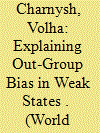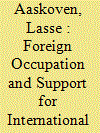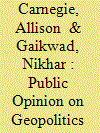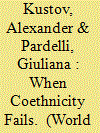| Srl | Item |
| 1 |
ID:
185604


|
|
|
|
|
| Summary/Abstract |
Two dominant explanations for ethnic bias in distributional outcomes are electoral incentives and out-group prejudice. This article proposes a novel and complementary explanation for the phenomenon: variation in legibility across ethnic groups. The author argues that states will allocate fewer resources to groups from which they cannot gather accurate information or collect taxes. The argument is supported by original data on state aid from the 1891/1892 famine in the Russian Empire. Qualitative and quantitative analyses show that districts with a larger Muslim population experienced higher famine mortality and received less generous public assistance. The Muslims, historically ruled via religious intermediaries, were less legible to state officials and generated lower fiscal revenues. State officials could not count on the repayment of food loans or collect tax arrears from Muslim communes, so they were more likely to withhold aid. State relief did not vary with the presence of other minorities that were more legible and generated more revenue.
|
|
|
|
|
|
|
|
|
|
|
|
|
|
|
|
| 2 |
ID:
185606


|
|
|
|
|
| Summary/Abstract |
A growing literature investigates how historical state repression affects later political outcomes, but little attention has been given to whether violence during foreign occupation affects support for international cooperation. This article investigates this issue by analyzing the 1972 Danish referendum on membership in the European Economic Community (EEC)—an organization seen at the time as being dominated by Germany. The analysis shows that municipalities that experienced more German-inflicted violence during the German occupation of Denmark (1940–1945) in World War II had a higher rate of no votes in this referendum. This effect seems to have worked through increased support for Danish far-left parties that were associated with the Danish resistance movement and that actively used anti-German sentiment in their campaigns against EEC membership. The results suggest that foreign-inflicted violence can be a substantial hindrance for popular support for international cooperation and that political parties play an important role in translating historical grievances into mass political behavior.
|
|
|
|
|
|
|
|
|
|
|
|
|
|
|
|
| 3 |
ID:
185603


|
|
|
|
|
| Summary/Abstract |
This article provides a systematic examination of the role of security considerations in shaping mass preferences over international economic exchange. The authors employ multiple survey experiments conducted in the United States and India, along with observational and case study evidence, to investigate how geopolitics affects voters’ views of international trade. Their research shows that respondents consistently—and by large margins—prefer trading with allies over adversaries. Negative prior beliefs about adversaries, amplified by concerns that trade will bolster the partner's military, account for this preference. Yet the authors also find that a significant proportion of the public believes that trade can lead to peace and that the peace-inducing aspects of trade can cause voters to overcome their aversion to trade with adversaries. This article helps explain when and why governments constrained by public opinion pursue economic cooperation in the shadow of conflict.
|
|
|
|
|
|
|
|
|
|
|
|
|
|
|
|
| 4 |
ID:
185605


|
|
|
|
|
| Summary/Abstract |
Why do communities with larger shares of ethnic and racial minorities have worse public goods provision? Many studies have emphasized the role of diversity in hindering public outcomes, but the question of causality remains elusive. The authors contribute to this debate by tracing the roots of both contemporary racial demography and public goods provision to the uneven historical expansion of the state. Focusing on new historical data from Brazil, the authors show that more remote municipalities with lower levels of state capacity in the past were more frequently selected by escaped slaves to serve as permanent settlements. Consequently, such municipalities have worse public services and larger shares of Afro-descendants today. These results highlight the pervasive endogeneity of the relationship between ethnic demography and public outcomes. The failure to account for context-dependent historical confounders raises concerns about the validity of previous findings regarding the social costs and benefits of any particular demographic composition.
|
|
|
|
|
|
|
|
|
|
|
|
|
|
|
|